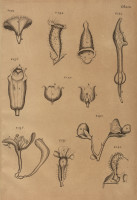Plant flowers
Date
1674
Creator
Marcello Malpighi (1628 - 1694, Italian) , Physician
Object type
Archive reference number
Manuscript page number
p122r
Material
Dimensions
height (page): 318mm
width (page): 230mm
width (page): 230mm
Subject
Content object
Description
Sectional studies of the flowers of various plant species viewed under magnification, including:
Figure 133 [top left]: Bindweed, Convolvulus, referred to by Malpighi as Convolvulo.
Figure 134 [top centre]: Foxgloves, Digitalis, referred to as Digitali.
Figure 135 [top right]: Birthwort, Aristolochia, referred to as Aristolochiae longae.
Figure 136 [centre left]: Hyacinth, Hyacinthus, referred to as Hyacintho matthioli.
Figure 137 [centre]: Lily, Lilium, referred to as Lilio convallio.
Figure 138 [lower left]: Violet, Viola, and honeysuckle, Lonicera, referred to as Violarum and Caprifolii respectively.
Figure 139 [lower left]: White jasmine, Jasminum polyanthum, daffodil, Narcissus, bugloss, and primrose Primula vulgaris, referred to as Jasmino albo, Narcisso, Buglosso, and Primula veris respectively.
Figure 140 [lower right]: Bean, Phaseolus, and pea, Pisum sativum, referred to as Faba and Pisis respectively.
Figure 141 [lower right]: Nettle, Urtica, referred to as Horminio.
Each drawn on an individual slip of paper and arranged on the page for printing. Inscribed: ‘Tab. XXIV’ in top right-hand corner.
Page 122 from MS/103/1, later published as Tab. XXIV in Marcello Malpighi's Anatome plantarum (1675).
Marcello Malpighi (1628-1694), Italian biologist and physician, was elected a Fellow of the Royal Society in 1669.
Figure 133 [top left]: Bindweed, Convolvulus, referred to by Malpighi as Convolvulo.
Figure 134 [top centre]: Foxgloves, Digitalis, referred to as Digitali.
Figure 135 [top right]: Birthwort, Aristolochia, referred to as Aristolochiae longae.
Figure 136 [centre left]: Hyacinth, Hyacinthus, referred to as Hyacintho matthioli.
Figure 137 [centre]: Lily, Lilium, referred to as Lilio convallio.
Figure 138 [lower left]: Violet, Viola, and honeysuckle, Lonicera, referred to as Violarum and Caprifolii respectively.
Figure 139 [lower left]: White jasmine, Jasminum polyanthum, daffodil, Narcissus, bugloss, and primrose Primula vulgaris, referred to as Jasmino albo, Narcisso, Buglosso, and Primula veris respectively.
Figure 140 [lower right]: Bean, Phaseolus, and pea, Pisum sativum, referred to as Faba and Pisis respectively.
Figure 141 [lower right]: Nettle, Urtica, referred to as Horminio.
Each drawn on an individual slip of paper and arranged on the page for printing. Inscribed: ‘Tab. XXIV’ in top right-hand corner.
Page 122 from MS/103/1, later published as Tab. XXIV in Marcello Malpighi's Anatome plantarum (1675).
Marcello Malpighi (1628-1694), Italian biologist and physician, was elected a Fellow of the Royal Society in 1669.
Object history
Marcello Malpighi’s research on the anatomy of plants was encouraged and supported by the Royal Society, as evidenced by correspondence between him and the then-Secretary, Henry Oldenburg FRS (1619-1677) in the 1660s and 1670s [MS/103/1].
An abstracted version of his work in this area was first read at a Society meeting on 7 December 1671 [JBO/4, pp.216-217]. The full manuscript of Anatome Plantarum, together with the frontispiece artwork and these plates, was received and read on 28 January 1674/75 [MS/103/1-2].
It was ordered for printing by the Society’s printer John Martin in June 1675 [CMO/1/221]. The published work consists of the text of Anatome Plantarum and De ovo incubato as an appendix, and 61 plates illustrating each [54 and 7 respectively].
An abstracted version of his work in this area was first read at a Society meeting on 7 December 1671 [JBO/4, pp.216-217]. The full manuscript of Anatome Plantarum, together with the frontispiece artwork and these plates, was received and read on 28 January 1674/75 [MS/103/1-2].
It was ordered for printing by the Society’s printer John Martin in June 1675 [CMO/1/221]. The published work consists of the text of Anatome Plantarum and De ovo incubato as an appendix, and 61 plates illustrating each [54 and 7 respectively].
Related fellows
Marcello Malpighi (1628 - 1694, Italian) , Physician
Associated place
